Managing Multiple Projects: Statistics
This blog is reader-supported. When you purchase something through an affiliate link on this site, I may earn some coffee money. Thanks! Learn more.
What are the key challenges when working on multiple projects simultaneously? How do you prioritize work when everything is important?
I asked 570 project managers these questions (and more) to find out what life is like in 2024 for project managers leading multiple projects, to follow on from my research on the same topic in 2022.
In this article, we’ll dive into my 2024 research results and you’ll learn:
- The 3 challenges that project managers struggle with
- The key skills required for managing multiple projects
- How many project managers are overwhelmed with work
- The scale of AI tools in use by project managers.
View the raw data
Scroll down to interrogate the data set which is embedded at the end of this article.
This wasn’t a survey about project portfolio management at the PMO level. Instead, I wanted to know what it’s like as someone who has a workload made up of several projects – because that’s the world I live in too.
Interested in how these managing multiple projects statistics differ from other research I’ve done? Check out these:
- Project management statistics and survey results (2023 study)
- Managing multiple projects research (2022, this informed my book, Managing Multiple Projects — first edition)
- Project management report (2021, this research is where the much-quoted “most project managers lead 2-5 projects” statistic comes from)
- Stakeholder management original research (2017)
- Collaboration tools for project managers survey (2015)
- Social media in a project environment (2011)
- Blog reader survey

Most project managers work on related projects
Most project managers reported managing 2 to 5 projects, which is consistent with my other research and past surveys. So no change there.
This time I asked about how those projects are managed, and 73% of the time it’s with an individual plan.
What is strange is that 50% of respondents said that their projects are related in some way, for example by client, so they absolutely could consolidate plans. Only 14% consolidate plans by sponsor or client/customer.
Leaders are not making use of the opportunity to consolidate plans – although we should also acknowledge that sometimes the portfolio of work you get means you can’t easily consolidate anyway.

Get your copy
Managing Multiple Projects: How Project Managers Can Balance Priorities, Manage Expectations and Increase Productivity is a book that offers a comprehensive framework for juggling your workload and still leaving the office on time.
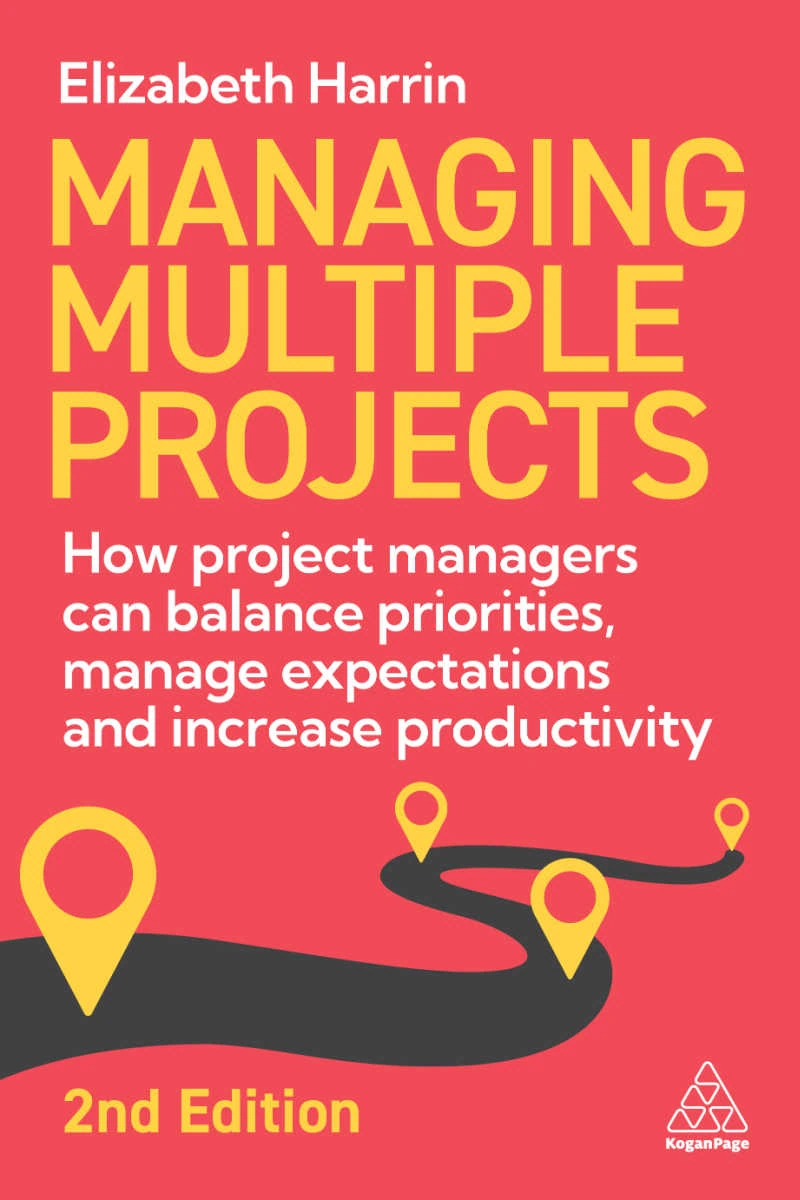
19% of project managers are overwhelmed
Nearly 1 in 5 project managers is overwhelmed. And a further 55% say they manage, but they aren’t loving the job. In fact, only 26% said they thrive on the challenge of managing multiple projects.
I’m not sure what we can take from this because everyone is different, and if I had done the survey, I would have answered differently depending on what day it was. Where do you fall on the spectrum?

65% of project managers say they struggle with perfectionism
Project managers are busy people, but one personality trait is common in my mentees and also in project managers I meet: perfectionism. I wanted to ask about this, as it can hold you back from managing your time effectively when you juggle multiple projects.
65% of project managers report struggling with being a perfectionist.
Nearly 50% said that being indecisive was a problem. That can lead to not being able to move forward without more data or more consultation – and while that could be a good thing in certain situations, sometimes you just need to move on.

35% of survey respondents said that putting additional time into preparing was a struggle for their time management.
Yes, we have to do a good job, but when you’ve got several projects on the go, it’s impossible to give every task the gold-plated standard. Some tasks have to be done well and some tasks simply need to be done.
A project manager says…
I have found that getting to know my weaknesses has helped, for example, if I procrastinate why?
If I over prepare or am a perfectionist why is this and how can I address those fears?
If I struggle to adopt new ways of working and to change then how can I help myself effectively?
Also, to recognize my organization’s culture and what can and cannot be changed has helped me to let some things go as beyond my control to change.
Most project managers prioritize their own workload
Half of project managers prioritize their own workload because there is no one else to do it for them.
- 16% have workloads prioritized by the PMO
- 17% have workloads prioritized by their manager
And if you don’t have those in place, or another way, then the only option is to try to work out what is the most important work yourself. That’s not easy, and it’s an extra burden for project professionals.

A project manager says…
It’s chaos, but the cat-herding can be incredibly rewarding when it’s successful. I try to focus less on how many projects I have and more on clearing the path for the implementers. They don’t need me to do their job, they need me to enable their job. Getting the red tape out of their way builds an incredible sense of shared focus and camaraderie.
Communication is the most important skill for managing multiple projects
Unsurprisingly, and in line with last time’s survey results, communication was ranked the most important skill for managing projects by 90% of project managers.
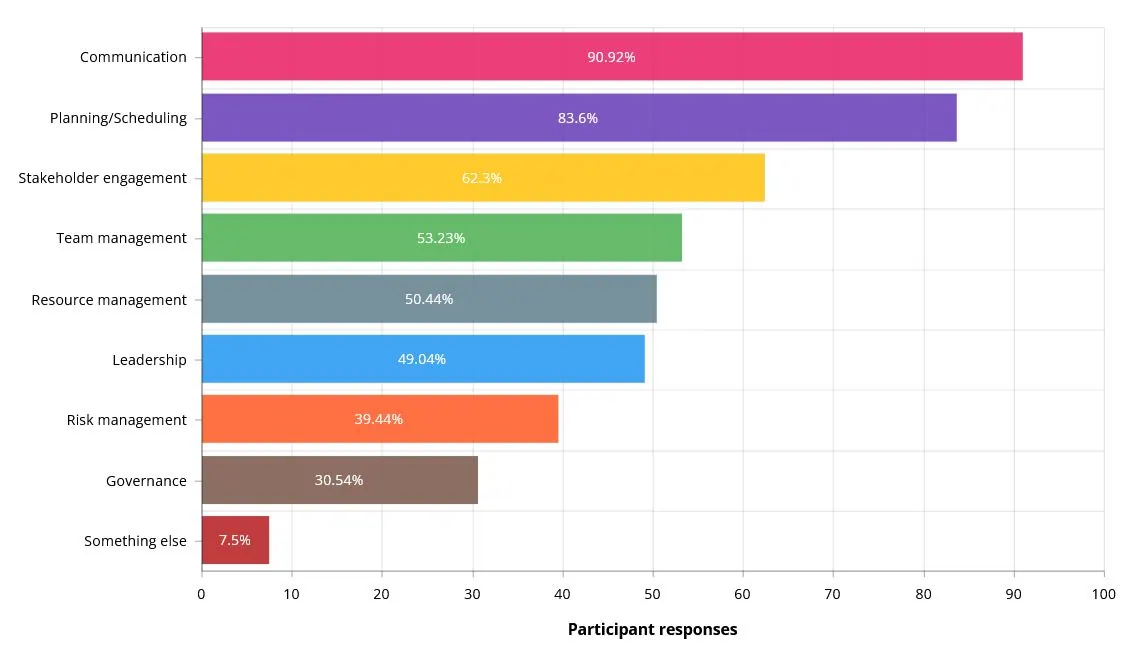
Communication was closely followed by:
- Planning/scheduling (84%)
- Stakeholder engagement (62%)
- Team management (53%)
- Resource management (50%) and more on that below
- Leadership (49%)
- Risk management (39%)
Governance came in last at only 31%. My own experience bears this out – when you’re busy, you lose a lot of the governance and attention to detail because you just don’t have time to fill in yet another document that no one will read. Focus on doing the governance documents and processes that make a difference.
A project manager says…
I don’t enjoy managing multiple projects, especially as the majority of my projects do not interlink, they are separate work areas with separate teams. Day to day, things are always a rush, and I don’t have the time to really understand the topics of work, the projects themselves and get to know the teams well enough. It always feels like you are at the surface level. There is no time to plan properly in order to get ahead of situations, and feels like it’s a constant battle of issues arising.
Most project managers curate their own templates
I thought that most project managers would have access to a standard document repository in all but the smallest of organizations. However, this doesn’t seem to be the case. 63% of project leaders say they have their own library of past documents that they use to build out their project documentation.
Only 35% have access to a PMO library of standard templates.
People were able to select more than one answer here, so it’s possible that some survey respondents have their own template library and a PMO standard document repository.

A project manager says…
I think the biggest thing I would like to know is how I can create my own checklists. We did have a PMO, but it’s been dissolved and I’ve been largely left on my own.
Managing resources on multiple projects
90% of projects use shared resources. In other words, the subject matter experts working on your project are also working on other projects. Having a dedicated, full-time team is rare.
The most common way to get people to work on projects is to talk to team leaders. That’s been part of the PMI resource management processes for as long as I can remember, but in reality, project managers often don’t have the seniority or authority to simply secure resources just by asking.
Nearly 40% of project managers already have known resources by the time the project gets to them which I think is good.
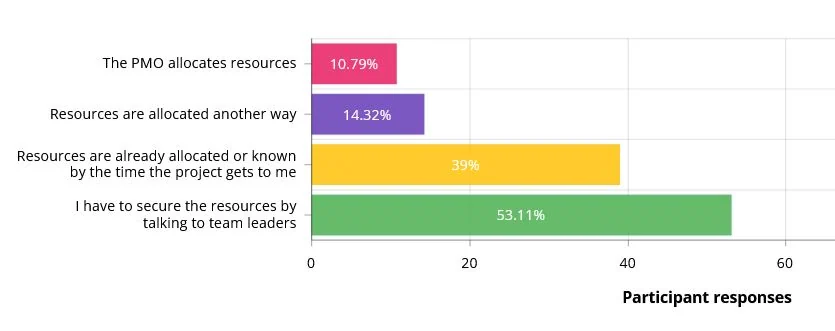
A project manager says…
It is incredibly challenging. Through this role, I’ve learned more than ever that common sense is not common, resources cannot always be relied upon to do the work they’re assigned to do and/or by the deadline they’ve agreed to do it. Vendor management has also gotten significantly tougher over the years – requiring SOWs and business requirements to be more explicit and detailed than they’ve ever been in the event it is identified that there are issues with deliverables (quality, gaps in requirements, timeliness) – I’ve personally experienced all 3 this year with at least 2 projects. Meetings are more often than not recorded (us and vendor). RfPs and POCs are also increasing because there is a lack of trust that vendors can deliver what they’re selling. It’s an aspect of project management that I don’t particularly love.
A project manager says…
Across the projects I work on I often encounter accountability issues when leading projects. Although the projects are given the green light to progress and are closely aligned to strategies and there are defined stakeholders the organizational culture tends to operate on the side of over consultation. This results in lack of decision making as no one person takes ownership even if this maybe their responsibility. This leads to circling around different stakeholders to try and secure a decision. This in turn creates delays in progressing the work or in some cases the project become shelved and no longer seen as a priority.
Do AI tools help manage projects?
In a word, no. AI tools do not (yet) help the majority of project managers do their daily work. Only 19% of respondents reported having access to and using AI tools. Everyone else either doesn’t have access to the tools or does not use them.
The barriers to access flagged in the verbatim comments were mostly around security concerns and AI tools not being ‘within policy’ to use. I think policies need to catch up, otherwise more and more employees will start using AI tools outside of the officially-sanctioned products. Shadow IT has always been a problem but it may be more of a concern as individuals try to tap into the tools that are out there but that aren’t officially in use.
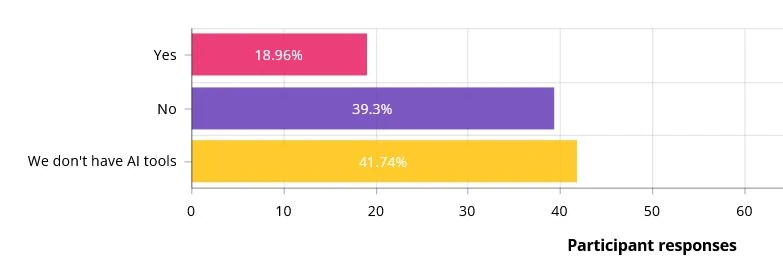
Tracking time (or not)
Most project managers (54%) don’t track time on their projects, but it’s very close. The survey did not ask people to say what industry they worked in, so I would assume that people who do track time work in professional services, agencies or other client-facing roles.
They could also work in in-house roles on projects where activity can be capitalized for accounting reasons if they are creating an asset (like we can do here in the UK) and that would require them to track time at least at a high level.
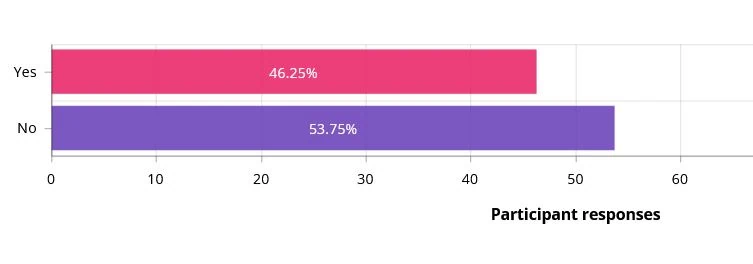
A project manager says…
I love the fast pace and no two days are rarely the same. You have to be super organized and it helps if you have the same sponsor or stakeholders for some projects. Working on multiple projects is a great way to get to know a vast range of stakeholders across your organization across, both business and technology, as well as external vendors. It really helps me to leverage governance materials and documents from previous projects so I’m not starting from scratch each time.
My projects would often in at various stages of the lifecycle so I had to prioritize my time based on which was at a most critical point or which had the most critical issues – but balance it so that I was still on top of all milestones and kept up good communications with stakeholders / sponsors.
I often found I had to work late or at weekends as I had little time during the work day as would be in back to back meetings due to the volume of projects I was managing in parallel – this was the only time I had a chance to catch up on actions from meetings, emails, write documentation. I tried to keep my Fridays as meeting free as possible or block out time in my calendar if I needed to prepare a document and was struggling to find the time.
What can we learn from these results
So what does this survey tell us? Here are my key takeaways.
- With nearly 20% of project managers reporting overwhelm, we run a serious risk of losing talent.
- Most project managers are perfectionists! We want to do an amazing job and don’t like it when organizational culture or workload means we can’t.
- Managers need to play a much greater role in setting priorities.
- Organizations need to up their game by creating standardized documents and processes for project management to alleviate the burden of having to create new materials on every project.
- Consolidate your project plans to save yourself time! Learn how in my book, Managing Multiple Projects.
View the data
Survey notes
This survey ran from end of June to early August 2024. It was promoted to my community on email and social media, so respondents self-selected to take part. There were 732 participants, resulting in 570 completed surveys. Around 6% of 680 respondents to the screening question answered by saying they were only managing one project, and they were excluded from continuing with the survey.
